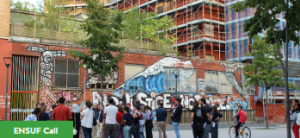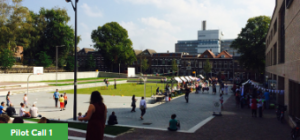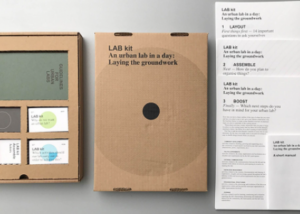On this page:
1. Why we fund and develop the Urban Living Labs approach
2. Urban living labs – co-design and experimentation spaces to improve urban life
3. Four key characteristics of urban living labs
4. Examples of urban living lab projects in JPI Urban Europe calls
5. Resources
6. We recommend/ further reading

——————————————————————————————————————–
1. Why we fund and develop the urban living labs approach
Going the extra mile is worth it. While it might take more effort and time to arrive at concrete, tangible results, the outcomes of open processes more effectively address concrete urban challenges. Urban experimentation has an important role to play in more systemic urban transformations and to transform cities to the better. Because of their practical and thematic flexibility, urban living labs are considered a flagship initiative among funded urban research and innovation objectives in JPI Urban Europe.
Innovation is a process in which new ideas (technologies, designs, procedures, etc.), and combinations of them, bring about changes in (sub)systems like supply chains, markets, urban regions, etc. This process can be incremental, radical or even disruptive. As an ambitious research- and innovation programme we want to contribute to improve urban transformation capacities and support projects that can truly transform cities to the better.
Urban experimentation has an important role to play in more systemic urban transformations and to transform cities to the better
2. Urban living labs: Co-design and experimentation spaces to improve urban life
The urban living labs approach is used to explore and tackle a wide variety of issues in everyday settings and can help test hypotheses and pathways towards regenerative urbanism, as well as, sustainability and liveability transformations. JPI Urban Europe uses this notion to describe methods, approaches and projects that substantially includes urban actors in processes of co-creation, co-production, learning-loops, and experimental approaches to improve urban life. It is an umbrella notion for methodological tools when the challenge at hand is understood to benefit from, or even require, experimental approaches and focused co-creation between groups of stakeholders and inhabitants.
The learning outcomes should contribute to capacity building for how to best handle urban challenges and dilemmas, also in the future
In JPI Urban Europe calls, an urban living lab will typically run for the length of a project (usually three years), although there are examples of longer-term lab settings (for example institutionalised ULLs run by cities or other institutions). Data is collected, knowledge is shaped, results are drawn together, and learning occur and in some situations, changes in the wider urban context happen. Systematic integration of the outcomes into urban governance is key to assure long-term impact and contribution of the urban living lab to sustainable and liveable urban transformations in cities and urban areas.
In urban living labs, participants shoulder the role of co-creators. The approach can be applied to the development of new products, systems, services, and processes in an urban area. Participants explore, examine, experiment, test and evaluate ideas, scenarios, processes, systems, concepts, and creative solutions – in response to complex everyday life settings. When a manifold of societal functions is involved in a research project, it can ensure more robust knowledge creation and impact.
3. Four key characteristics of urban living labs
| INCLUSIVE AND PROFOUND STAKEHOLDER ENGAGEMENT
Stakeholder participation in urban living labs goes far beyond adding a reference group to a traditional research project. In an urban living lab, stakeholders (those who would be affected in an everyday life situation) are deeply and actively involved from the early project stages. The research is by its design open for surprises and learning that originates from the stakeholders involved. It is a forum for research and discovery, that by its design is open for exploration in almost any direction, and where the terminology adopted is inclusive and understandable to stakeholders outside academia. From an academic perspective, Urban living labs are transdisciplinary.
|
RESPONDS TO CHALLENGES AND BUILDS CAPACITY
The purpose of urban living labs is not necessarily to produce new and original knowledge, but to respond to challenges. Urban living labs should create value and explore ways to form synergies out of urban dilemmas – to achieve sustainability goals. This may include the reusing or adaptation of already existing knowledge and innovations, together with its initiators and change makers. The learning outcomes should aim to contribute to capacity building for how to best handle urban challenges also in the future. Urban living labs aim for long-term value-creation also after project funding ends.
|
| FLEXIBLE INNOVATION METHOD OPEN FOR FEEDBACK AND LEARNING
An urban living lab maintains the rigor and orderliness characteristic of a scientific method. At the same time, it needs to embrace the flexibility, the openness to coincidence, and the iterative nature of working across disciplines, organisations, and sectors. The methods applied facilitate the creation of knowledge which is translatable to new contexts. Methods are in this sense response-attentive and, again, challenge-driven; plans and initial targets can change due to participants feedback or external circumstances. |
IN THE MIDST OF EVERYDAY URBAN LIFE
An urban living lab is located right where the process and challenge being addressed takes place, in everyday urban life, typically but not exclusively on a neighbourhood scale. In this way, the outcomes can demonstrate a clear practical outcome. There are ethical considerations as to when to apply it and how. If the urban living lab involves digital tools, the reasons for this needs to be carefully evaluated and thought of in relation to context. |

——————————————————————————————————————–
4. From 1.0 to 2.0 – Towards a new generation of urban living labs
The urban living labs approach has grown and spread in Europe the past decade. About half of the over 100 projects funded by the JPI Urban Europe so far applied experimental co-creative methods, mainly in the form of urban living labs (projects available here). Together these projects have practiced over 180 urban living labs. The labs have dealt with dilemma situations ranging from urban governance, water management and e-participation to mobility management, inter-ethnic coexistence, and stakeholder involvement.
Because of their practical and thematic flexibility, urban living labs are considered a flagship initiative among funded urban research and innovation objectives in JPI Urban Europe. However, after our 10 years of supporting experimental and co-creative approaches to city-making, such as urban living labs, one central question surfaces: If the added value of co-creative and experimental methods has now been proven, how can we integrate it better into mainstream urban development processes for more effect? In other words, how can we make experimental approaches the “new normal”?
We have discussed these approaches, and the potential to do things differently by experimental methods, with urban actors across the globe: from Europe to Beijing, Rio de Janeiro and Florianopolis in Brazil, and Durban in South Africa. On a conceptual level, we learned a lot about how urban living labs and experimental models can lead to more sustainable cities, more economic opportunities, a better quality of life for city-dwellers and our habitats.
If the added value of co-creative and experimental methods has been proven, how can we integrate it better into mainstream urban development processes for more effect?
If urban living labs could truly streamline with urban governance, realize and communicate their full learning potentials and many co-benefits, then exercises like “public participation” would no longer be considered a “side activity” in urban strategies or a “tick in the box”. It would be an absolutely necessary instrument in sustainable urban development – a tool which we, at this point in history, simply cannot afford to overlook. The way we see it, “Urban Living Labs 2.0” can legitimise (placemaking and public space investments) and decentralize (power and decision making).
We continue to explore what is, and should be, the 2.0 version of urban living labs, and several of our learnings are integrated into this page. Some lessons learned were published on the EUKN blog. If you want to join us, do not hesitate to get in touch!
Contact: info@jpi-urbaneurope.eu
——————————————————————————————————————–
5. ULL projects in JPI Urban Europe calls
We have supported circa 50 R&I projects that work with urban living labs in different ways, bot practically and conceptually. Below are a few examples. To find more, please go to our projects page.
- SmarterLabs guidelines (ENSCC call, 2016 – 2019)
- SubUrbanLab (Pilot call one, 2013 – 2016)
- GUST Policy brief: “Municipalities and Urban Living Labs” (Pilot call 2, 2015).
- URB@Exp (Pilot call two, 2014)
- WASTE FEW ULL (SUGI call, 2018 – 2021)
- CRUNCH project with ULLs in Asia, North America, and Europe (SUGI call 2018 – 2021)
- Creating Interfaces (SUGI call, 2018 – 2021)
- FLOODLABEL (ENSUF call, 2017 – 2020)
- PlaceCity by Placemaking Europe and Eutropian (Making Cities Work call, 2019 – 2022
——————————————————————————————————————
6. Resources
In this list you find results and outputs from JPI Urban Europe urban living lab activities and projects.
Blog post: Why experimental methods drive urban transitions: Lessons learned from 10 years of programming Urban Living Labs on the Urban Voice Blog by EUKN. (2021)
Book chapter: Are urban living labs the new normal in co-creating places? in Co-Creation of Public Open Places – Practice – Reflection – Learning (2021)
Book chapter: City Engagement in the Joint Programming Initiative Urban Europe – and the Role of Intermediary Organizations in R&I Policies for Urban Transition (2021)
Webinar with ENRICH Brazil: Urban Living Labs: Experimenting for sustainable urban transformations. (2020)
Report: Towards a definition of socially oriented Urban Living Labs by the project SoHoLab supported in the ENSUF call (2020)
Webinar: Urban Lunch Talk #7 – From Test to Success. What are Urban Living Labs 2.0? (2019)
Web article: Urban Transitions Pathway Symposium in Maastricht. Systematic integration of Urban Living Labs results, contributions to urban transformations? (2019)
Conference session report: Urban Living Labs for Placemaking and Urban Transitions, Experiences from Placemaking Week Europe (2019)
Guidelines: How to anticipate constraints on upscaling inclusive Living Labs experiments made by the SmarterLabs project in the ENSCC call. (2019)
Workshop report: JPI Urban Europe at the Open Living Lab Days 2019 in Thessaloniki
Leaflet: Download Urban Living Labs by JPI Urban Europe to overview some of the supported projects (2018)
Presentation: Presentation by DRIFT during a joint workshop by FINEP and JPI Urban in Rio de Janeiro (2018)
Workshop report: Urban Living Labs in China – joint workshop by the Chinese Academy of Urban Planning (CAUPD), the Trans-Urban-EU-China project, and JPI Urban Europe in Beijing, PR China (2018)
Conference session report: Translating global policies into local actions: JPI Urban Europe at Urban Future and Austrian Smart City Days (2018)
Lab kit: An urban lab in a day – Laying the ground work by URB@Exp project (2017)
Handbook: The Emerging Landscape of Urban Living Labs – Characteristics, Practises and Examples by the GUST project in JPI Urban Europe Second Pilot Call (2017)
Interview: Kes McCormick (GUST project) interviewed on advancing the role of living labs (2015)
Blog article: ‘Renaturing cities’ by Urban Living Labs (2014)

——————————————————————————————————————–
7. We recommend/ further reading
There are numerous stakeholders and organisations in Europe and beyond developing and implementing urban living labs. JPI Urban Europe regularly collaborates with more organisations to exchange experiences and move forward together. Below you find a few organisations and initiatives that we wish to draw your attention to.
- Training: The Open Living Lab days and the virtual learning lab course
- Tool: Her City and #UrbanGirlsMovement
- Tool: UNaLab handbook
- Book: Urban Living Labs – Experimenting with City Futures. Edited By Simon Marvin, Harriet Bulkeley, Lindsay Mai, Kes McCormick, Yuliya Voytenko Palgan. (2018)
- Article: Beyond Urban Living Labs: The making of transformative urban innovation systems.
- Managing Environmental and Energy Transitions for Regions and Cities (OECD) Paper by Harriet Bulkeley: Managing Environmental and Energy Transitions in Cities: State of the Art & Emerging Perspectives.
- Paper: “Experimentation or projectification of urban change? A critical appraisal and three steps forward” (2021) Jonas Torrens & Timo von Wirth
—————————————————————————————————————————————-
For more activities and materials about Urban Living Labs, simply use the search function on the JPI Urban Europe website. To find and connect with supported projects, tick “yes” to Urban Living Labs on the projects search page
Contact: info@jpi-urbaneurope.eu
